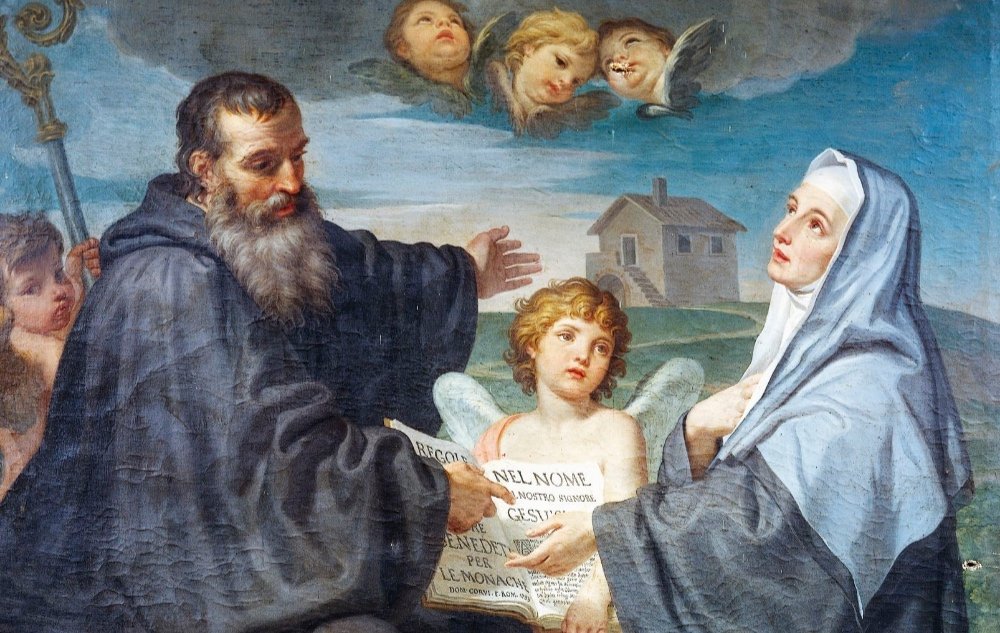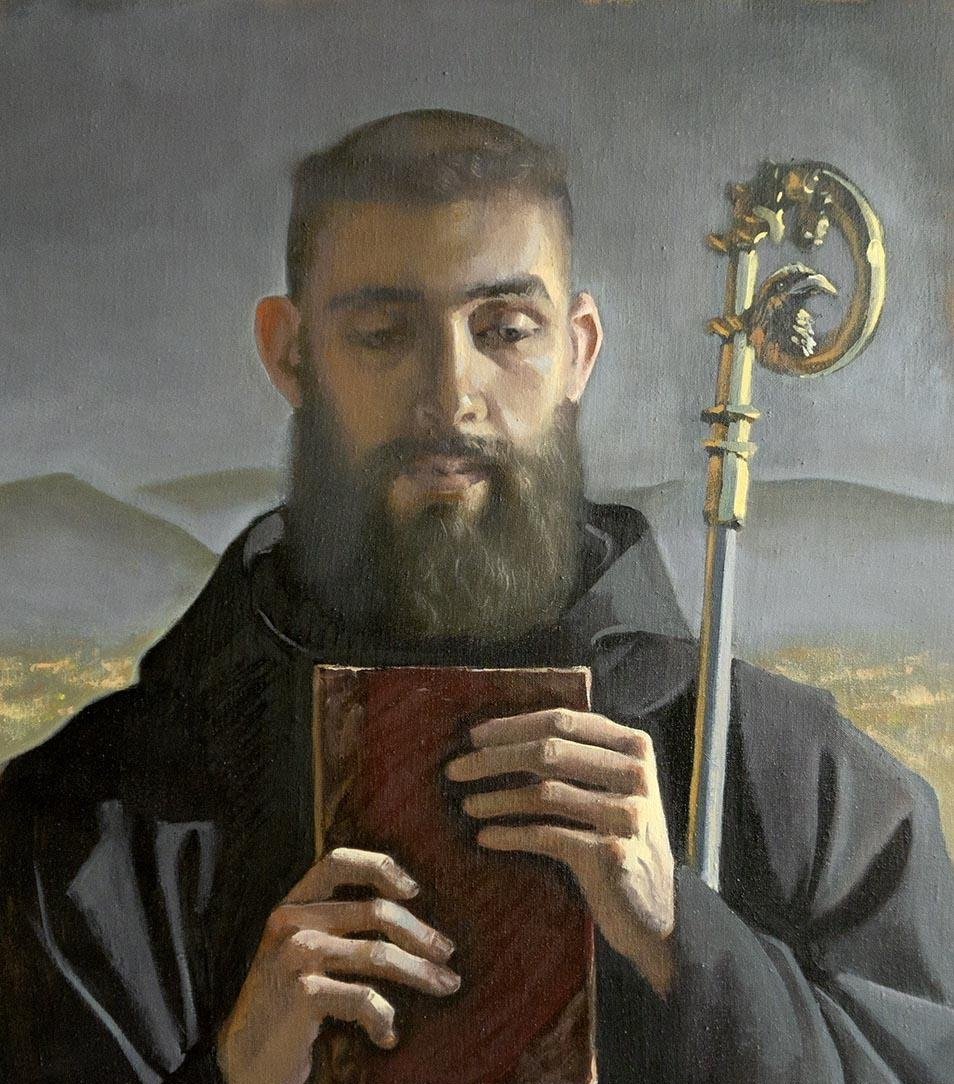
FAQ’s
Is God calling you to be an Oblate?
St. Benedict envisioned his Rule, his written way of life, to be accessible to everyone pursing the Christian life. Oblates therefore remain active in their local parishes and Christian communities and are encouraged to lead by example in order to strengthen the spiritual experience and invigorate the entire community. Oblates of St. Benedict include all Christian denominations.
Photo below: Saint Benedict, detail, Gwyneth Thompson-Briggs

FAQs
-
Oblates of St. Benedict are Christian men and women who choose to associate themselves with a Benedictine religious community in order to strengthen their baptismal commitment and enrich their Christian way of life. The life of any Christian is a self-offering to God in gratitude and in loving response to the God who has first so lovingly and graciously offered Himself to us in Jesus Christ.
"Oblation" means offering. Oblates seek to offer themselves more fully to Christ and to the Church by pondering the wisdom found in the Rule of St. Benedict and by entering into fellowship with their community of affiliation. By these means, Oblates discover ever anew that God calls us to holiness of life, and that the Rule and the Benedictine community can be instruments of God's grace in their vocation to become holy in the world.
-
Many Christians find they are attracted to the Oblate Program because they are seeking God in Jesus Christ and have begun to find Him through their acquaintance with a Benedictine community and through the Christian values manifested by the community and its Oblates.
They have come to recognize Christ's presence in the Benedictine community and in the spirit of the Rule of St. Benedict, both of which they have come to regard as gifts of God meant to nurture their spiritual lives.
-
The first step to becoming an Oblate Novice is to contact the Leader St. Cosmas Deanery. If possible, attend several deanery meetings to assist in discerning (See RB 58:3-5). The Deanery Leader can then send the necessary application form, a copy of the latest Oblate newsletter, and other publications concerning Oblates and Benedictine spirituality.
Upon being invested, an Oblate Novice makes a temporary personal commitment of at least a year to learn about Benedictine spirituality and to apply it in daily life. If, after a year or more of a temporary commitment, one may seek to make a lifelong commitment as a full Oblate.
-
Unlike members of Third Orders, Oblate Novices and Oblates are affiliated not with the whole Benedictine Order, but with a particular monastic community of Benedictine monks or sisters. For St. Cosmas Deanery, the monastic community with which we are connected is St. Vincent Archabbey, Latrobe, PA. Inquirers should, therefore, discern carefully which community they should affiliate. Geographical closeness is certainly a key factor, but some people may choose a more remote monastery because of their personal histories, personal ties with some of the monks, or other factors involved in the calling that they have received from God.
-
One must first of all be a baptized and practicing Christian. A Roman Catholic seeking to become an Oblate Novice must be in full communion with the Catholic Church—that is a confirmed Catholic regularly receiving the Eucharist.
A non-Catholic Christian must be in good standing with his or her particular denomination.
Clergy who do not belong to a Religious Order are welcome to apply.
Lay people who apply should not have an official affiliation with another religious community. A person affiliated with another religious community through a Third Order or other formal means should follow proper procedures to withdraw from the other group before applying to become an Oblate Novice.
A candidate for Novice Oblation should be at least 14 years old and discern a call to a richer Christian life through a following of the Rule of St. Benedict and through affiliation with the monks of St. Vincent Archabbey through St. Cosmas Deanery.
-
To become an Oblate Novice, one must complete an application form from the Deanery Leader. If the application is approved, a ceremony can be scheduled.
The ceremony for becoming an Oblate Novice is called "investiture." It is best to be invested in the presence of an Oblate community, family, and friends. If that is not possible, a private ceremony is allowed. The ceremony can be in the context of a prayer service, Mass, or it may stand alone.
-
Yes! Each person 14 years or older though must complete an individual application form and be invested.
Children under 14 years of age need not complete the application, but they may be invested in the ceremony with the other members of their family and may receive an investiture card. Although these younger members do not become "Oblate Novices" in the strict sense, they are considered members of an "Oblate family." When they reach the age of 14 or older, they can decide on their own whether to apply to be invested as Oblate Novices.
The practice of becoming an "Oblate (novice) family" can encourage members of a Christian family to grow together spiritually through the living out of Benedictine values. There are several books available that specifically address the issue of applying the Rule of St. Benedict to family life. Those who are considering the option of family Oblation may wish to consult with families who have chosen this path.
-
Yes! A Christian of any denomination may enter the Oblate Program if in good standing with his or her denomination, if feeling called to follow the spirituality of the Rule, and if the required application is completed.
However, a Catholic who becomes an Oblate Novice or an Oblate and then leaves the Catholic Church may no longer remain in the Oblate Program.
